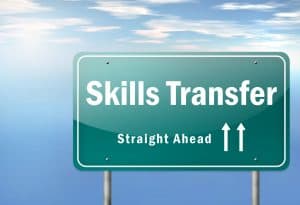
In my last post on career change, I advised sifting and sorting through your transferable skills to determine which will cross over to a different industry or career field. Skills that have strength in career frameworks are not limited to being useful within a single kind of role, field, or workplace setting.
On the contrary, most skills valued in the work world have the benefit of attracting attention as important across many work-related boundaries. For example, the ability to write well is valued across corporate, non-profit, academia and government sectors. In fact, most of the skills that are important in a job have a similar feature: they can be applied in a wide variety of work settings to a wide variety of tasks. They are transferable.
We can group skills into three categories: adaptive, functional, and specific subject. Adaptive skills tend to develop earlier than functional skills, yet they are often not recognized or valued until embarking upon in-depth career exploration. Both adaptive and functional skills are extremely transferable.
Adaptive skills refer to those competencies that enable an individual to acknowledge and adjust to the physical, interpersonal, and organizational conditions in which a job exists. Included are punctuality, follow-through, acceptance of supervision, care of property, and getting along with other folks.
Functional skills refer to those competencies that enable an individual to relate to Things, Data, and People (orientation) in some combination according to personal preferences and to some amount of complexity appropriate to abilities (levels).
Specific subject skills refer to those competencies that enable an individual to perform a specific job aligned with the criteria of an employer and the standards of an industry or market.
Adaptive and functional skills are frequently catalogued in specific subject terms. The word you might use to convey a skill that seems very specific to your job muddles the fact the skill is highly transferable. For example, if you are an accountant (subject), you may fail to note that you are effective handling detail, or adapting to peaks of the seasonal work load (functional and adaptable).
The same job could be performed well by two different people who have different functional and adaptive skills.
A successful administrator, for example, might have these skills: tact with boards of directors and c-level leadership, navigating financial data, and being able to make tough decisions. Another person – just as effective in the same position – might possess the skills of program development, coaching teams, and effective management of people.
Let’s look at how skills are transferable. Let’s say you want to be a loan officer at a bank. You list the skills you think are most important to the role of loan officer:
Watching money and spending prudently, supervising people, making financial decisions, reading and interpreting detailed reports, analyzing numerical data, working methodically, interacting with the public and customers, and staying abreast of market needs.
Of course, your list will vary and should take into account due diligence into that role. The important piece here, is to ask yourself, “If I were to take away the title of Loan Officer from this list, would the skills listed indicate clearly that it is a loan officer being described? No! The skills noted are either functional or adaptive, and they are clearly transferable. They might be applied to any of numerous other jobs or careers.
So, what are your transferable skills?
When someone asks you (or you ask yourself), “What can I do in my life that will enhance my chances of advancing in the work world?” don’t just think about the specific subject skills available from formal training programs, educational credentials, or day-to-day experience. Here are a few examples:
- Thinking skills. Defining a problem sensibly; evaluating alternative courses of action analytically; creating different solutions to a problem when more than one answer is possible; forming new ideas in the framework of old conditions.
- Human relations skills: Interacting easily and collaboratively with bosses, subordinates, and peers; communicating orders, instructions, and feelings with sincerity, candidness, and thoughtfulness; delegating tasks in ways that show respect for those involved and openness to their ideas.
- Communication skills: Writing reports, correspondence, and essays in clear language; speaking effectively to individuals and to groups; listening carefully and empathically; portraying ideas crisply and resourcefully.
- Research skills: Spotting and categorizing people who have information that is relevant to a task or a problem; identifying resource materials necessary to the solution of that problem.
- Planning skills: Being able to recognize a timely idea, to move toward work approaches that capitalize on this idea, and to sell the idea to the appropriate people.
If we go back to our administrator example, a good one would have some minimum level of all the skills; however, two different people might empathize some of the skills more than the others. So, as you evaluate your work, ask yourself, “What did I do?” rather than “What was my title?”
You’ve worked hard for your transferable skills. Let them serve you well! Let others know about them. In every scenario you face professionally, the ability to successfully articulate your transferable skills, along with the capacity to show relevant and compelling examples of successes and lessons learned, will enable you to stand out positively through every stage of your job search process.

